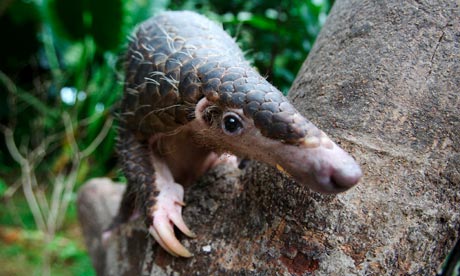 |
| Endangered ... the plight of the pangolin is not helped by its low profile compared with threatened species such as elephants, lions and tigers. Photograph: How Hwee Young/EPA |
The scaly anteater is less well-known compared with other illegally hunted species, but it is highly prized by traffickers. Last year tens of thousands of elephants and hundreds of rhinos were
slaughtered to meet the growing demands of illegal trade in wild animals.
Largely centred on eastern Asia, this black market is also devouring
hundreds of tigers, sharks, tortoises, snakes and other rare beasts.
It's a flourishing trade, worth an estimated $19bn a year. But little
attention is paid to the pangolin, or scaly anteater, one of the mammals that suffers most from such poaching.
Trade
in the pangolin was banned worldwide in 2000, but the meat and supposed
medicinal qualities of this unobtrusive animal – the only mammal to
sport scales – have made it one of the most highly prized targets for
traffickers in Asia. The meat is considered a great delicacy
and many believe the scales can cure various diseases, including asthma
and certain cancers, as well as boosting virility. Pangolins have
become so rare that they may fetch as much as $1,000 a piece on the
black market.
As a result, two out of four of the Asian species — the Sunda, or Malayan, pangolin, and its Chinese counterpart (respectively Manis javanica and Manis pentadactyla) — are endangered and the other two are near threatened, according to the International Union for Conservation of Nature
(IUCN). Two of the four African species are near threatened too. There
are no figures for the number of specimens in existence worldwide, but
the experts warn that their disappearance would alter the ecosystem of
tropical forests, due to the rise in the number of ants and termites. Read more..
Source: guardian.co.uk